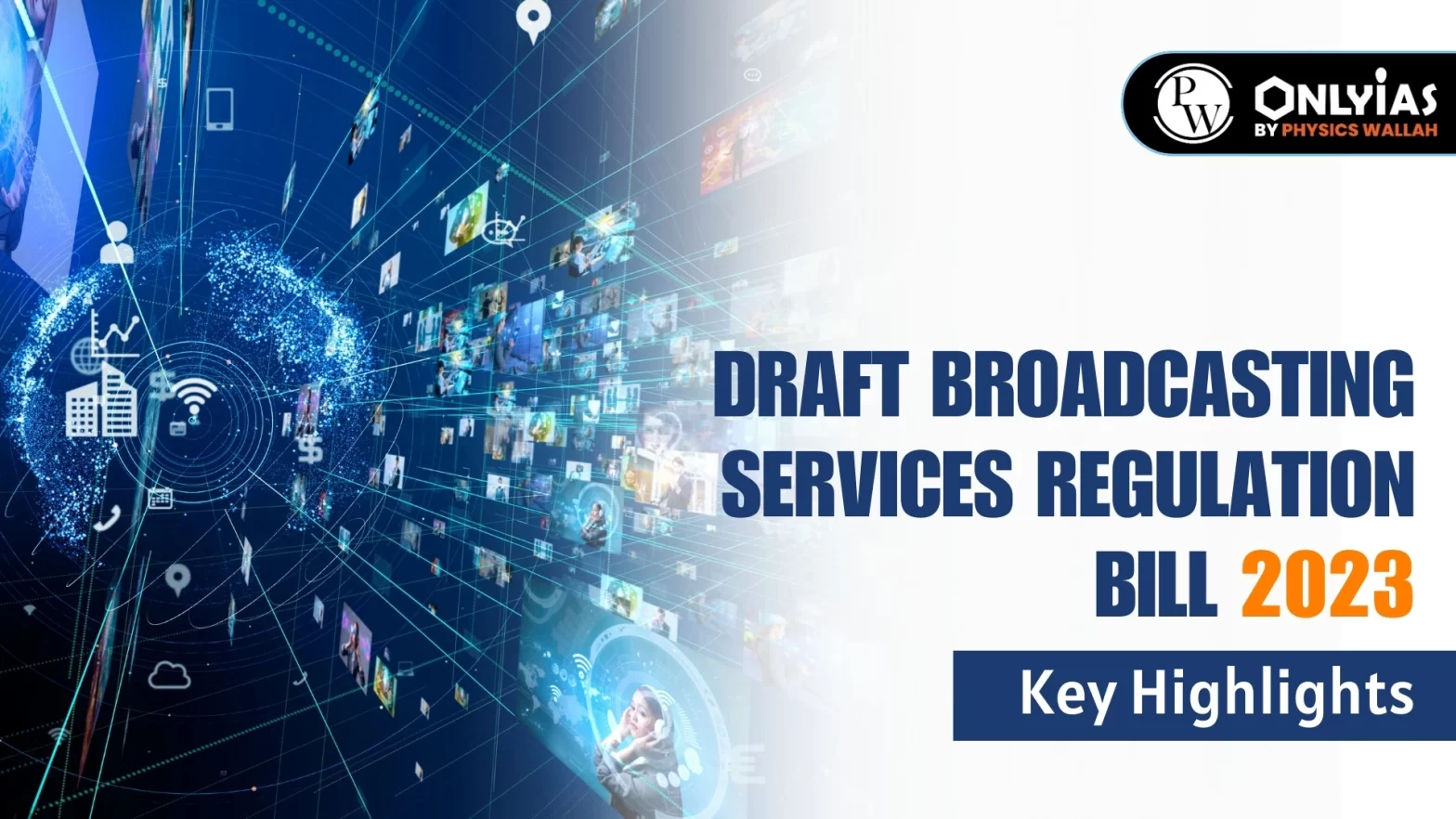Context: This article is based on an Editorial “Broadcast regulation 3.0, commissions and omissions” Which was published in the Hindu. Recently, the Union Ministry of Information and Broadcasting has invited comments on the Broadcasting Services Regulation Bill 2023.
- The Broadcasting Bill of 1997 was the first effort to visualize an integrated regulatory framework for this sector and this 2023 Bill is the third rendition.
| Relevancy for Mains: The Broadcasting Services Regulation Bill 2023, Cable Television Networks (Regulation) Act of 1995, Broadcast Advisory Council, and OTT Regulation in India.
Relevancy for Mains: The Broadcasting Services Regulation Bill 2023 holds significance for UPSC Mains as it addresses the evolving landscape of broadcasting in India, issues related to technological advancements, and regulatory framework consolidation. |
Why is this new Broadcasting Services Regulation Bill 2023 needed?
- Technological Advancements: The Cable Television Networks (Regulation) Act of 1995 has been in effect for three decades, serving as the primary legislation on linear broadcasting.
- However, the broadcasting landscape has undergone significant changes in the interim. Technological advancements have introduced new platforms such as DTH, IPTV, OTT, and various integrated models.
- For Cohesive Approach: With the digitization of the broadcasting sector, especially in cable TV, there is a growing need to streamline the regulatory framework.
- This involves ensuring ease of doing business and enhancing adherence to the Programme Code and Advertisement Code by the broadcasters and Distribution Platform Operators.
Also Read: Regulation Code For OTT Platforms in India
What are the key highlights of the Broadcasting Services Regulation Bill 2023?
- Consolidation and Modernization under a single legislative framework to streamline the regulatory process and make it more efficient and contemporary.
- Contemporary Definitions and Future-Ready Provisions to keep pace with the evolving technologies and services.
- Strengthening of the Self Regulation Regime with the introduction of “Content Evaluation Committees” and evolving the existing Inter-Departmental Committee into a more participative and broader “Broadcast Advisory Council”.
- Allow Differentiated Programme Code and Advertisement Code across various services and require self-classification by broadcasters and robust access control measures for restricted content.
- Accessibility for Persons with Disabilities for enabling provisions for the issue of comprehensive accessibility guidelines.
- Statutory Penalties and Fines such as advisory, warning, censure, or monetary penalties, for operators and broadcasters.
- Provision for imprisonment and or fines remains, but only for very serious offenses, ensuring a balanced approach to regulation.
- Equitable Penalties considering the investment and turnover to ensure fairness and equity.
- Infrastructure Sharing, Platform Services, and Right of Way to address relocation and alterations more efficiently, and establish a structured dispute resolution mechanism.
- Inclusion of Private Players: The provision to permit private actors in terrestrial broadcasting will encourage competition with Doordarshan, the state broadcaster, as is in many G-20 countries.
- Transparency:
- Data and Audit: As broadcasting network operators and broadcasters would need to maintain records of subscriber data, and subject this to periodic external audits.
- Audience Measurement: The Broadcasting Services Regulation Bill 2023 seeks to stipulate a methodology for audience measurement, and the sale of ratings data.
What concerns are associated with the Broadcasting Services Regulation Bill 2023?
- Environment of Threat: The broadcasting services regulation bill 2023 threatens individual journalists and creators by requiring them to register and follow broadcasting rules when commenting on news.
- Dominance of Government: The broadcasting advisory council is dominated by government bureaucrats rather than independent voices.
- High Censorship: It expands censorship and control from TV channels to all online broadcasting and streaming platforms. For example, it requires online platforms to classify their content.
- Preventing Diversity: There are no provisions for measuring the extent of cross-media and vertical ownership, which prevents the diversity of suppliers and viewpoints.
- On Redressal of Grievances: The Broadcasting Services Regulation Bill 2023 plans a “Broadcast Advisory Council” to examine viewers’ grievances and violations of the Programme Code and Advertisement Code, which raises concern about the capacity of the Council to track and address grievances.
The Path Ahead:
As the Broadcasting Services Regulation Bill 2023 aims to devise an integrated regulatory framework for broadcasting, it must not lose the opportunity to protect press freedom and diversity. For desirable, effective, and balanced regulation, the Bill must address loopholes, and jurisdictional conflicts, reconsider positive provisions, and address omissions.
Conclusion
The Broadcasting Services Regulation Bill 2023 seeks to modernise and consolidate the regulatory landscape of broadcasting in India, it must carefully address concerns related to press freedom, diversity, and individual rights to ensure a balanced and effective regulatory framework.
|
Prelims Question (2019)
In India, which of the following review the independent regulators in sectors like telecommunications, insurance electricity, etc.?
1. Ad Hoc Committee set up by the Parliament.
2. Parliamentary Department-Related Standing Committee
3. Finance Commission
4. Financial Sector Legislative Reforms Commission
5. NITI Aayog
Select the correct answer using the code given below.
(a) 1 and 2
(b) 1, 3 and 4
(c) 3, 4 and 5
(d) 2 and 5
Ans: (d)
|
![]() 1 Dec 2023
1 Dec 2023
